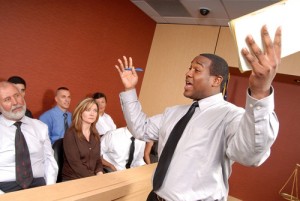Steve McConnell writes a post for the Drug and Device Lawyer Blog about an angry liar of a plaintiffs’ lawyer who keeps hitting 8-figure verdicts and settlements.
How can this happen? Steve figures out the solution to this problem the way most of the vexing litigation challenges are solved. This lesson came during an invariably pandering lunch with an in-house counsel client who figured the paradox of why juries reward dirtball plaintiffs’ lawyers with big verdicts. The answer is that an angry jury — no matter the source of the anger — is bad for the defense.
Their message in all of this for trial lawyers is clear: we should turn hundreds of years of psychology and trial advocacy on its head because some in-house counsel type – who may or may not have taken trial ad in law school – offers his solution during a suck up lunch.
I will give Steve the benefit of the doubt here and assume he is acting as a double agent disseminating bad information for plaintiffs’ lawyers. I could send the Drug and Device Law Blog the zillion of trial advocacy/trial strategy books my firm has bought over the last 10 years. (I could put the Drug and Device Law Daughter mentioned in the post through college with the money we have blown on these books.) No one has remotely suggested this is a wise tactic. Ever. This flies in the face of not only conventional wisdom but “new school” trial advocacy (see, for example, David Ball on controlling a witness without controlling a witness.) Making people not like you is just a bad idea.
The whole idea is so condescending: a sympathetic plaintiff and an angry jury trump all. Really, if jurors are this dumb, we have to see if King George is available because the whole idea of democracy is just dumb. If these people are so foolish, why are we letting them vote?
Thankfully, for justice, Steve offers a cure for corporate giants to beat this unbeatable plaintiffs’ lawyer and sympathetic plaintiff duo everyone hates. Curiously not mentioned: try not to recklessly kill and maim people. Because, you know, that has never happened before.
But there is a point here. Bad lawyers sometimes get great verdicts. What is the answer to this apparent contradiction of the evil plaintiffs’ lawyer and the big verdicts? Because there is no question this happens all the time.
Short story to underscore this point. I was a defense lawyer taking frequent depositions at one plaintiffs’ lawyer’s office in a piece of mass tort litigation. The premise was inane – they virtually all collapsed – and the lawyer taking the depos was not exactly competent. His office was a glorified rat hole. Yet I found out this same lawyer had made a recent failed bid to buy a major league baseball team. The take-home message for me was being a good lawyer was not sine qua non of being a successful personal injury lawyer. Shortly thereafter, I switched sides.
How did this guy get so big time? One possibility is pure luck. If things are going well for you in this life, read “The Black Swan: The Impact of the Highly Improbable.” You will walk away thinking you just got lucky.
But I think this theory misses the larger point: getting good cases is the key to having a successful plaintiffs’ practice. There is no law that only good plaintiffs’ lawyers get good cases. The skill sets to get personal injury cases and prepare them and try them overlap a bit (and more so, admittedly, for defense lawyers). But not much. You are far better off being a bad lawyer with a good case than the reverse. Why? Because juries usually get it right.
It is worth pointing out that while I’m ripping Steve McConnell’s post here; I read him all the time which is saying something because he is writing a defense-oriented blog. He’s crazy talented and a better writer than I am. I just think the theory offered in this blog is just plain wrong and it comes from a place of being so blindly partisan for defendants. Am I partisan? Of course. Am I blindly unrepentantly partisan? I sure hope not.
 Maryland Injury Law Center
Maryland Injury Law Center

